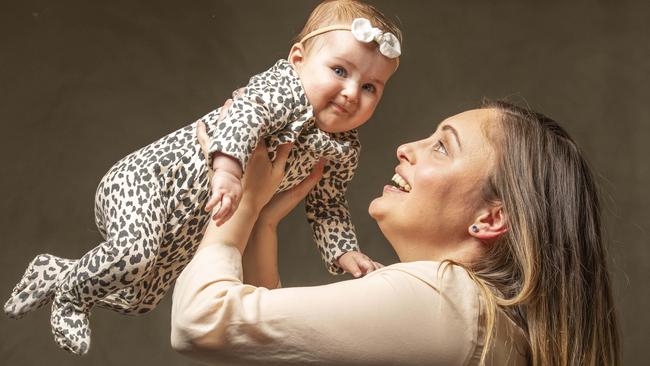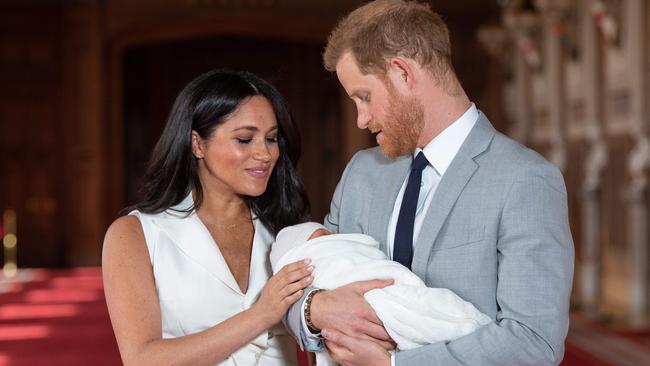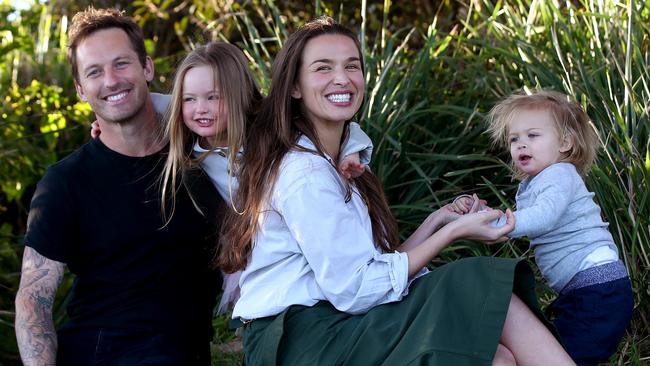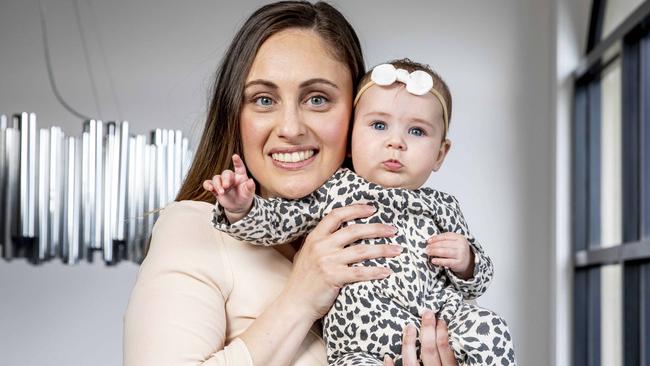The silent grief of miscarriage
In Australia, one in five women will experience the heartbreaking loss of a miscarriage. So why the stigma that leads to silent grief?

Dealing with grief is a deeply personal process.
It comes in many shapes and forms — it can be isolating, traumatising, sometimes healing.
But when that grief is compounded by a culture of silence, it can have a profound impact.
In Australia, about one in five women will experience a miscarriage.
Yet so many have and continue to suffer behind closed doors.
“We live in a world where we don’t want to admit our ‘failures’ and we expect things to happen straight away,” Dr Joe Sgroi, a fertility specialist at Melbourne IVF and Epworth Freemasons, says.
“We know that the vast majority of miscarriages have nothing to do with the couple or parents. But unfortunately with miscarriage, it is common — yet no one talks about (their fertility).”
Sgroi is a proud advocator for women’s health and fertility and has long campaigned for the narrative around pregnancy loss to change.
He wants people to speak about losing an unborn child — if and when they are ready — so that women and couples know they’re not alone.

He also believes traditions like waiting until the 12-week scan to tell people about a pregnancy should be rethought, so that if something tragic does happen support networks are already in place. “As obstetricians and fertility specialists, miscarriages are the saddest thing we have to see. Any pregnancy loss is a loss of a potential life … and a potential life in terms of them or the woman being parents,” Sgroi says.
“One of things we endeavour to do is normalise what’s happening — and that’s not in a heartless way. We’re having the discussion about miscarriage, which is great. But we’ve got to have the discussion about seeking appropriate council and support. That’s really important.”
From a medical perspective, Sgroi says that includes “going on that emotional journey with your patients, understanding they’re fragile and sad and that the whole situation is really unfair”.
But as a community, it means having the tough conversations.
Australian mother and actress Tahyna MacManus is doing just that in her new film Misunderstandings of Miscarriage.
While in the grips of her own grief MacManus, 34, documented the heartbreaking reality of pregnancy loss in emotional video diaries and talks with women and couples who have experienced similar loss.
MacManus and husband Tristan, who have lived in LA, Melbourne and now Sydney, have suffered three miscarriages.
The first, in 2015, happened while they were in what MacManus describes as a “lovely naive bliss”.
“I had really strong pregnancy symptoms and one morning I woke up and noticed they were gone,” MacManus recalls.
“We were living in LA — we went to the ER and the sonographer said there’s nothing (no heartbeat) there, you should go home and take a Panadol for the pain.
“I struggled a lot. And unbeknown to me so did my husband. We went through what we did, what we ate. It was incredibly painful.”
In the months that followed, the young couple fell pregnant again with daughter
Echo, now 4.
But MacManus says the grief and trauma of her miscarriage meant it was “very hard to enjoy” being pregnant.
“I was going back and forward to the doctors asking to get my blood check, I was really anxious,” she says.
Tragically, 18 months later MacManus experienced a second, and then later a
third loss.
“(After Echo) we experienced a missed miscarriage — not only did all those emotions come flooding back, but I had layers of guilt. I thought ‘I’ve got Echo so I should (be happy)’.
“It was physically traumatic too —
I was bleeding for 12 weeks and had to get surgery,” MacManus says.
The decision to document her trauma came after MacManus’s second miscarriage, when she realised “the conversation was a little bit larger than me”.

“The more I spoke with my friends, I reached out and spoke with family members,
I started to see common feelings and emotions. I was lucky enough to have an incredible support system around me, but I was very aware that other women won’t,” she says.
“I think that’s the hardest part, society in general and partners, they don’t know how to support — the support system needs support.”
And it’s that notion that her film is trying to change — one conversation at a time.
“The whole (film) journey for me was a way of honouring that loss and processing that grief,” MacManus, who also has an 18-month-old son, Oisin, and is expecting her third child, says.
“I’m incredibly proud and I’m honoured that this group of women shared their journeys with me and the medical professionals that were able to provide me an understanding of what I was feeling.
“I’m also very well aware that I ended up with children, we know that’s not the reality for all women. And you’re no less of a woman if you can’t have children or are struggling.”
Speaking about pregnancy loss is something that has garnered strength in recent years, with high-profile women leading the way in reaching out and opening up about their grief.
Last November, Meghan Markle, the Duchess of Sussex, penned a heart-wrenching letter in the New York Times revealing the pain she and Prince Harry suffered after experiencing a miscarriage.
“I knew, as I clutched my firstborn child, that I was losing my second,” the letter reads.
“I tried to imagine how we’d heal … losing a child means carrying an almost unbearable grief, experienced by many but talked about
by few.”
The Duchess spoke of the hurt, stigma and “(unwanted) shame” and highlighted the impact of simply asking others if they were OK.
“In being invited to share our pain, together we take the first steps toward healing,” she said.

Ringwood North couple Melissa Apostolopoulos and partner Rob, both 35, were blessed with daughter Mia, 5, in 2015.
The “happy, outgoing and full of life” preschooler was the beginning of a family the couple had long wanted.
But about a year later, when they decided to fall pregnant for a second time, their perfect world soon shattered.
“We fell pregnant pretty much straight away, we were so excited,” Apostolopoulos says.
“We got to 12 weeks and had the scans — everything was perfect, the baby was healthy.
I had a 16-week appointment too and the baby was OK, then two days after that I went into preterm labour.”
The shock was “devastating”.
“I would cry everyday. It’s hard to grieve for a baby that you never … we had her but it’s the life we were hoping for. The future of this little thing,” she says.
“I didn’t know if what I was feeling was right, I didn’t know if it was normal.
“I was offered counselling but I denied it at the time because I thought I was OK. I didn’t want to talk about it, but at the same time I did.”
She says it was the love of daughter Mia, then 2, that “saved” her in those dark days — especially when about 12 months later they suffered a second miscarriage.
“I think after the second miscarriage I was a little more open to talk about things. I don’t know why,” Apostolopoulos says.
“The first one really threw me for a loop. But I think that because I got through them, I had Mia — I knew we were going to be OK.”
Apostolopoulos is now a proud mum to Mia and Ava, five months.
Her pregnancy with Ava, like for MacManus, was “stressful” and complications meant she was placed on bed rest from 20 weeks.
And while the family now cherish their “adorable” girls, they are still struck by moments that are bittersweet.
“I’m very, very grateful for my two girls. But you never forget the ones you’ve lost, you think about where you would be now,” Apostolopoulos says.
She now wants to “open up that conversation” and help other women, and couples, speak out about their grief.
“Talking about grief is hard, talking about grief to a mother who has lost her baby is hard … (but) when I started talking about it people would say ‘oh my family member …’
“It’s not about the children you’ve got or the babies you might have in future, it’s about the babies you’ve lost and the fact that you’ll never be the same.”
It’s families like the Apostolopouloses that were at the forefront of Victorian Premier Daniel Andrews’ mind when announcing a new commemorative certificate for bereaved parents in December.
At the moment, miscarriages and babies born before 20 weeks gestation who show no signs of life cannot be registered via Births, Deaths and Marriages. They can now be marked by a hand-designed certificate which Andrews hopes will help “parents mourn the child they never got to meet”.
If you or someone you know needs support, contact Pink Elephant on 1800 882 436, SANDS on 1300 072 637 or Bears of Hope on 1300 114 673





